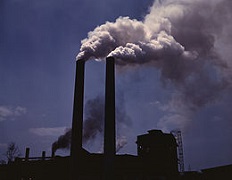Urban Air Quality
A variety of air pollutants have harmful effects on human health and the environment. In most areas of Europe, these pollutants are principally the products of:
- incomplete combustion from burning fuels for space heating
- power generation
- motor vehicle traffic.
All but two of London's boroughs are exceeding EU limits for nitrogen dioxide, a toxic gas linked to respiratory problems. Over 50 locations in London exceed the EU legal limits for nitrogen dioxide by two and a half times.
According to the latest figures available from the OECD, premature deaths and ill health caused by air pollution cost the UK economy an estimated $86bn (£56bn) in 2010.
Urban Air pollution can be reduced by using ground source energy
There are alternatives to the three principal causes of air pollution:
- combustion for space heating can be replaced by all electric heating using interseasonal heat transfer and Seasonal Thermal Energy Storage
- power generation from burning fossil fuels can be replaced by power generation from solar, wind and nuclear
- motor vehicles driven by fossil fuels can be replaced by electric vehicles.
Urban Air Pollution
Air pollution is contamination of the environment by any chemical, physical or biological agent that modifies the natural characteristics of the atmosphere. Household combustion devices, motor vehicles, industrial facilities and forest fires are common sources of air pollution. Pollutants of major public health concern include particulate matter, carbon monoxide, ozone, nitrogen dioxide and sulfur dioxide. Outdoor and indoor air pollution cause respiratory and other diseases, which can be fatal.
More than 5.5 million people worldwide are dying prematurely every year as a result of air pollution, according to new research compiled as part of the Global Burden of Disease Project. Most of these deaths are occurring in the rapidly developing economies of China and India. The main culprit is the emission of small particles from power plants, factories, vehicle exhausts and from the burning of coal and wood.
Air pollution is estimated to shorten the lives of more than 50,000 people a year in the UK in cities where the air is classed unfit to breathe - far higher than the number of deaths caused by traffic accidents (1,713 in 2013).
Health effects
If you are young and healthy, low levels of air pollution are unlikely to have serious effects. However, elevated levels or long term exposure to air pollution can lead to more serious symptoms and conditions affecting human health. This mainly affects the respiratory and inflammatory systems, but can also lead to more serious conditions such as heart disease and cancer. People with lung or heart conditions are more susceptible to the effects of air pollution.
The table shows the types of health problems experienced from the most common pollutants:
| Pollutant | Health hazards at high levels |
| Nitrogen Dioxide, Sulfur Dioxide, Ozone | These gases irritate the airways of the lungs, increasing the symptoms of those suffering from lung diseases |
| Particulate matter | Fine particles can be carried deep into the lungs where they can cause inflammation and a worsening of heart and lung diseases. They can also be carcinogenic. |
| Carbon Monoxide | This gas prevents the uptake of oxygen by the blood. This can lead to a significant reduction in the supply of oxygen to the heart, particularly in people suffering from heart disease |
Air pollution also causes damage to plants and animals, affecting biodiversity and crop yields.
The World Health Organisation identifies key risks of air pollution
The WHO has identified the following key facts:
- Air pollution is a major environmental risk to health. By reducing air pollution levels, countries can reduce the burden of disease from stroke, heart disease, lung cancer, and both chronic and acute respiratory diseases, including asthma
- The lower the levels of air pollution, the better the cardiovascular and respiratory health of the population will be, both long- and short-term
- Outdoor air pollution is estimated to have caused 3.7 million premature deaths worldwide in 2012
- Policies and investments supporting cleaner transport, energy-efficient housing, power generation, and better municipal waste management would reduce key sources of urban outdoor air pollution
- Reducing outdoor emissions from burning coal, gas and biomass for heating would reduce air pollution
- Reducing outdoor air pollution also reduces emissions of CO2 and short-lived climate pollutants such as black carbon particles and methane, thus contributing to the mitigation of climate change
Air pollution can be reduced by using ground source energy
There are alternatives to the three principal causes of air pollution:
- combustion for space heating can be replaced by all electric heating using interseasonal heat transfer and Seasonal Thermal Energy Storage
- power generation from burning fossil fuels can be replaced by power generation from nuclear and renewables
- motor vehicles driven by fossil fuels can be replaced by electric vehicles.
Conclusion
It is now possible to reduce the level of urban air pollution by using alternatives to burning fossil fuels for generating heat and electricity and for transport: Clean Heating and Electric Vehicles.
Contact ICAX
We prefer to work in conjunction with architects and M&E consultants from the earliest stage to ensure that there is a clear understanding of how we can help to deliver a sustainable building with a high carbon offset.
We can install a heating – and cooling – system which emits no pollutants on site, and no CO2 either.
Please email enquiries to
or give us a ring on 020 7253 2240.
See Ground Source Heating See Ground Source Cooling See Ground Source Energy

